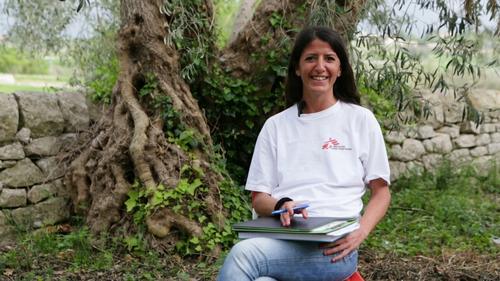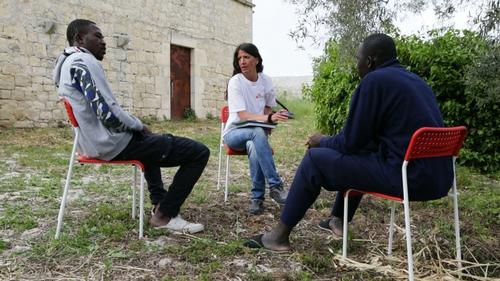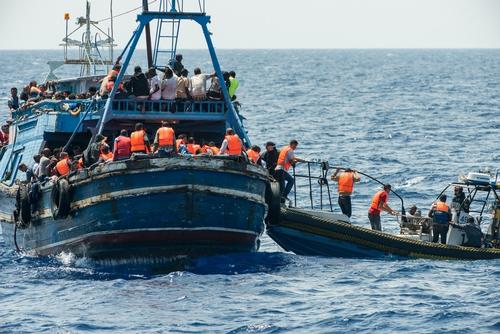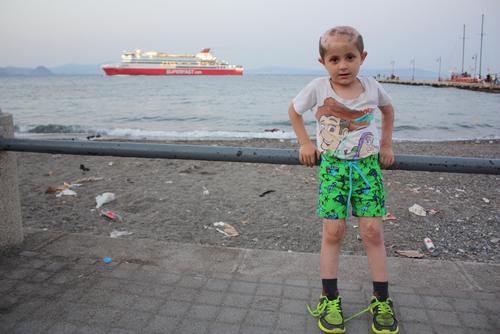Médecins Sans Frontières (MSF) is currently providing mental health care in sixteen reception centres in the Ragusa province in Sicily, which accommodate 400 migrants in total.
Psychologist Gaia Quaranta tells of her experiences working at the reception centres in Sicily.
115,000 migrants and refugees have arrived to Italy by boat since the beginning of the year. Who are the people behind these numbers?
For many Italians, these people are a homogeneous and undifferentiated mass of human beings identified under the common denominator of "migrant". However, for those of us who work every day with these people they are individuals and human beings, not just numbers without a name. Many of them have experienced traumatic events in their home countries such as war and violence. On their journey to Europe, some have experienced rape and abuse or witnessing friends and family die along the journey. Most of the people are male, between 19 and 30 years old, coming from Nigeria, Mali, Gambia and Senegal.
After the landing, what is the role of MSF psychological support?
We focus on the emotional wounds which might be less apparent than the physical ones, but take much longer to heal – the invisible wounds. Many people are suffering from stress, sleep disorders, nightmares, panic attacks, difficulty in trusting others and forming relationships and depressive illness or anxiety, and post-traumatic stress. The first support that patients receive are in the form of psycho-educational group sessions. These are then followed by sessions for people that want to talk to a psychologist individually. For cases that need follow up, a series of brief psychological consultations will be offered. When necessary, we also refer people to local mental health services.

What do people talk about during the psychological support sessions?
We hear eloquent and moving testimonies that really show evidence of the resilience of human beings during awful traumatic experiences. In some cases, people have witnessed deaths or they have been kidnapped. Many have been detained, tortured and raped before and during their journeys here to Europe. Many have experienced traumatic events such as armed conflict or violence. A Nigerian boy told me how his father and his brother were killed in front of his eyes. He also lost his mother, after the fire damaged their home. He then escaped with his younger brother to Niger. In the town of Agadez, he was imprisoned and tortured. During the summer of 2014, he managed to escape from the prison and run to Libya, where his brother was killed in a bomb blast. He is now in Italy after having crossed the Mediterranean Sea, and he is now hosted in a reception centre in Ragusa Province.
What are the challenges of providing care to these people?
When it comes to mental health among asylum seekers it is crucial for the psychologist not to focus only on the traumatic past. It is also fundamental to relate the different forms of psychological distress with the experiences and challenges of the present. While they are waiting in the reception system, the asylum seekers have to live with the uncertainty over their future. A few elements which particularly affect them is the uncertainty of the outcome of their asylum requests, and fear of being sent back home. On top of this, the loneliness that some of them experience in the reception centres continues to haunt them. In many cases, these elements represent the most significant obstacle to the re-establishment of balance in their mental well-being.
Between January and August, an MSF team composed of two psychologists carried out 37 group sessions to more than 300 people, and provided psychological treatment to 103 asylum seekers - providing in total 600 consultations. Elsewhere in Sicily, MSF teams in collaboration with the Provincial Ministry of Health are providing medical care in the Pozzallo landing port and inside the first reception centre, which is the place where people stay during the first days after arrival.







